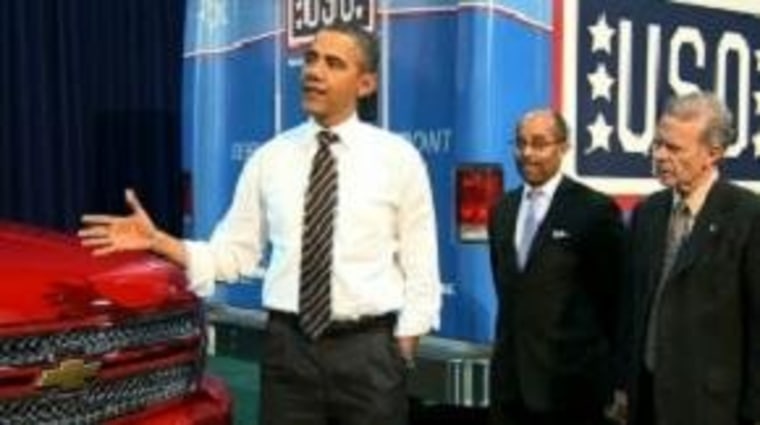President Obama stopped by the Washington Auto Show the other day, and seemed quite pleased to declare, "The U.S. auto industry is back." The president added, "[I]t's good to remember that the fact that there were some folks who were willing to let this industry die."
It's hard to blame Obama for boasting and needling his critics. When he launched an ambitious rescue of the auto industry in 2009, the president was taking a major gamble -- not only with the backbone of American manufacturing, but with his presidency and its ability to use the power of government to repair a private industry facing collapse.
That gamble now appears to have paid off beautifully. Andrew Leonard takes a look today at where things stand, both for the American auto industry and the politics surrounding the debate.
Dueling pundits, start your engines: The auto industry kicked off 2012 with a turbo-powered roar, and Democrats won't wait long to make hay out of the impressive numbers. The question of the day: How will the GOP respond to one of the most successful displays of forceful government intervention in the economy the U.S. has witnessed in decades?The numbers are hard to argue with: After the major automakers released their January sales figures, Autodata Corp. estimated cars raced out of lots at an annualized sales rate of 14.18 million vehicles for 2012. That's the best month of sales -- excluding August 2009′s Cash-for-Clunkers -- since April 2008.
The good news is starting to pile up: Chrysler has posted its first profit in 15 years; GM is building new American facilities; and plants are operating at a capacity unseen in a long while.
The Wall Street Journal reported today, "The auto industry hasn't just turned the corner. It's starting to accelerate."
Had it not been for federal intervention and government action, these heartening headlines would have been impossible.
Remember, dozens of prominent Republican officials, including most of the GOP lawmakers in the House and Senate, as well as the party's leading presidential candidates, were absolutely certain the rescue would be a disaster. In the midst of an economic crisis, Republicans saw the American automotive industry -- one of the central backbones of the nation's manufacturing sector -- teetering on the brink of collapse, but the GOP was prepared to simply let it fail, forcing hundreds of thousands of workers into unemployment during an already-severe jobs crisis.
Mitt Romney's infamous phrase was, "Let Detroit go bankrupt."
What's more, Republicans were equally certain that Obama's rescue plan was hopeless. It was a foregone conclusion, they said, since government intervention in the marketplace is always a disaster. Consider these predictions made at the time:
Rep. John Boehner (R-OH): "Does anyone really believe that politicians and bureaucrats in Washington can successfully steer a multi-national corporation to economic viability?" [6/1/09]Sen. Richard Shelby (R-AL): "It's basically going to be a government-owned, government-run company.... It's the road toward socialism." [5/29/09]RNC Chairman Michael Steele: "No matter how much the President spins GM's bankruptcy as good for the economy, it is nothing more than another government grab of a private company and another handout to the union cronies who helped bankroll his presidential campaign." [6/1/2009]Sen. Jim DeMint (R-SC): "Now the government has forced taxpayers to buy these failing companies without any plausible plan for profitability. Does anyone think the same government that plans to double the national debt in five years will turn GM around in the same time?" [6/2/09]Rep. Tom Price (R-GA): "Unfortunately, this is just another sad chapter in President Obama's eager campaign to interject his administration in the private sector's business dealings." [6/2/09]Rep. Lamar Smith (R-TX): The auto company rescues "have been the leading edge of the Obama administration's war on capitalism." [7/22/09]Rep. Trent Franks (R-AZ): When government gets involved in a company, "the disaster that follows is predictable." [7/22/09]
On this, they were wrong -- about literally every aspect of the debate -- and Obama was right.
